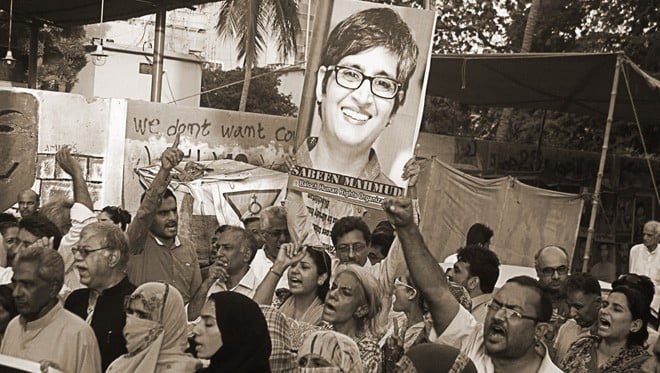
Debating all the issues confronting the Baloch is the only way out of present chaos

Ordinary people are made to believe that talking Balochistan is dangerous. It can cost one’s life also. That Sabeen Mahmud was assassinated after organising a seminar on a sensitive topic in April 2015 promotes the scare in discussing the Baloch afflictions.
Back in Quetta, the gruesome murders of Professors Saba Dashtiari in 2011 and Safdar Kiyani in 2008 confirmed the open truth that all is not well in the troubled province. More than a dozen prominent academics have been gunned down in the province during the past five years in Balochistan. It has been pushed towards anarchy with political forces losing control of the situation. Body language of the well-intentioned but seemingly powerless provincial chief minister clearly suggests that he and his regime have very little control over the compounded ailments.
The presence and interference of foreign elements in the province under various garbs is now an undeniable fact. The sad episode of Turbat killings is a case in point.
But not all foreigners have ill designs. Many of them have been operating as NGOs, aid workers and civil society activists for more than two decades. Many nationalists criticised the increasing presence of international community around and warned of harmful outcomes.
The worst of the recent happenings is the near total loss of trust amongst the powerful stakeholders in the political process of the province. Whereas one finds occasional visits by one national leader or the other in a bid to resolve the woes of the province, the net outcome remains miniscule.
The Balochistan imbroglio is now largely internationalised. Past events such as the ban on insurgent organisations, abduction and killing of foreign engineers and briefings by Baloch legislators to the international media reporters have brought greater focus of international community towards the Balochistan scenario. The popular perception is that the current handling of Balochistan crisis by the establishment is not likely to yield any concrete results.
It has been historically observed that whenever the law and order situation deteriorates, the government announces vague financial doles for the development of the province. Political circles normally view such moves of the regime as an attempt to divert public attention from the core matters.
The regime must display a magnanimous attitude by announcing amnesty and ceasefire according to strategic precautions. The top leaders of all the factions including present coalition parties, religious political parties, Balochistan National Movement, Jamhoori Watan Party, Baloch Students Organisation and other groups may also be invited to dialogue sessions under the auspices of the provincial government. All the tribal chiefs and representatives may also be invited.
The objectives of dialogue need to focus on striking a working relationship among the government, political parties and tribal chiefs; developing a roadmap to stop violence through acts of confidence-building and preparation of an agenda of negotiation by the federal government. This is vital because there are many matters where the provincial government does not possess jurisdiction and authority.
This attempt may become ineffective if the establishment does not come forward with an open approach. Release of prisoners allegedly detained for political views and help in locating the missing individuals can be the starting moves by the establishment to convince the other side about their sincerity.
There is a need to clarify conflicts surrounding various development projects announced by the federal government in Balochistan. Be it the strategic China Pakistan Economic Corridor, extension of highways/railways, gold/copper mining or the construction of new cantonments, the entire portfolio of development initiatives need a careful examination.
While the negotiating parties may hold on to their respective viewpoints, sustainable benefit to the people of Balochistan should be the paramount consideration for deciding any final course of action. Genuine grievances of the Baloch must be addressed on priority.
One must at least take a cue from the pre-partition British regime which gave a participatory role to the influential Baloch in administration and developmental works. Unless the sense of ownership of development projects is not inculcated in the Baloch masses, little affiliation can be expected towards the outputs.
The establishment has been accusing some of the sardars of supporting insurgent organisations. There is no denying the existence of these entities but they are effects of the simmering socio-political suffocation prevailing in Balochistan for decades. These entities cannot be taken as causes. Formation of such outfits indicates the fact that certain stakeholders have found themselves alienated with the mainstream political process.
In the case of Baloch insurgent organisations and sympathiser groups, the approach of pushing them to the wall shall prove enormously dangerous. The past experiences of dealing with National Awami Party by the Bhutto regime and Al Zulfiquar by the Zia administration in a high handed manner turned out to be damaging exercises. Brokering peace and stability by enhancing the mandate of current provincial government is imperative.
Members of the ruling coalition must be authorised to strike a peace deal with agitators. Space and time must be allotted for this process to nurture. The format and agenda can be all encompassing. Controversial and delicate issues -- the status of non-Baloch in the government service cadres, abduction and illegal confinement of citizens by criminal gangs, sectarian violence, development spending, provincial autonomy and socio-political reforms in the society -- may also be brought for debate.